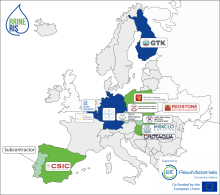Brines of RIS countries as a source of CRM and energy supply


| Project leader | Project manager | Project duration |
|---|---|---|
| Prof. Dr.-Ing. Tobias Fieback Dr.-Ing. Thomas Grab | MBA. Timm Wunderlich | 1 January 2022 to 31 December 2024 |
About the project
Background
In order to achieve the European climate protection targets, storage technologies for electrical energy from wind or hydropower, for example, are essential. Currently, the limited access to critical raw materials (CRM) such as lithium, magnesium or strontium is one of the main obstacles to the development of the high-tech and battery sector. The use of highly mineralised water (brine) could offer a solution for the local and independent extraction of these critical raw materials directly in Europe. These brines, which usually occur at great depths at high pressure and high temperatures, can have a mineralisation of up to 300-350 g/l
Project BrineRIS
The BrineRIS project focuses on identifying brines in Europe where economic metal extraction is possible. In addition, possible extraction technologies that are currently being developed in other projects, such as EuGeLi and Morecovery, are being tested in the laboratory. The project's investigation area covers the Iberian Peninsula and the countries of the Visegard Group (Poland, Czech Republic, Slovakia, Hungary). In particular, existing mine water inflows in the countries and geothermal wells in operation are to be analysed. In summary, the BrineRIS project pursues the following three main objectives:
- Mapping the brines and estimating the respective potential for the extraction of critical raw materials as well as for renewable heating and cooling
- Exchange of experience and knowledge between RIS countries and non-RIS countries as well as education and training of students and experts
- Acquiring investors in the RIS countries for potential geothermal brine projects
The TU Bergakademie Freiberg is looking at the geothermal potential of the brines. Due to the generally high temperatures, these brines can be used for heating and, at lower temperatures, for cooling. In addition to their use for the regenerative supply of buildings with heat and cold, the project is also analysing whether the heat or cold can be directly coupled into the raw material extraction processes. Finally, the potential will be visualised in a map.
Project partners involved
The project is being led by the Wrocław University of Science and Technology from Poland.
In addition to TU Bergakademie Freiberg, partners from Spain, Hungary, Belgium, Finland, Poland, Slovakia and the Czech Republic are also involved.
Further information on the BrineRIS research project can be found on the general project website.
